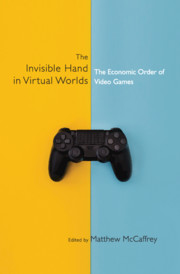Book contents
- Frontmatter
- Contents
- Introduction
- 1 The Economic Meaning of Play: Ludology and Praxeology in Video Game Worlds
- 2 Spontaneous Order and Video Game Narrative
- 3 Law and Economics in a World of Dragons
- 4 Minerals, Titans, and Connections: The Political Economy of Empire in the World of EVE Online
- 5 The Origins of Money in Diablo II
- 6 A Virtual Weimar: Hyperinflation in Diablo III
- 7 The Facilitate or Acquire Decision: The Tipping Points for Strategies toward User-Generated Content in Massively Multiplayer Online Game Platforms
- 8 Mod the World: How Entrepreneurs Learn from Video Game “Modding” Communities
- 9 Levels without Bosses? Entrepreneurship and Valve's Organizational Design
- About the Contributors
- Index
8 - Mod the World: How Entrepreneurs Learn from Video Game “Modding” Communities
Published online by Cambridge University Press: 31 July 2021
- Frontmatter
- Contents
- Introduction
- 1 The Economic Meaning of Play: Ludology and Praxeology in Video Game Worlds
- 2 Spontaneous Order and Video Game Narrative
- 3 Law and Economics in a World of Dragons
- 4 Minerals, Titans, and Connections: The Political Economy of Empire in the World of EVE Online
- 5 The Origins of Money in Diablo II
- 6 A Virtual Weimar: Hyperinflation in Diablo III
- 7 The Facilitate or Acquire Decision: The Tipping Points for Strategies toward User-Generated Content in Massively Multiplayer Online Game Platforms
- 8 Mod the World: How Entrepreneurs Learn from Video Game “Modding” Communities
- 9 Levels without Bosses? Entrepreneurship and Valve's Organizational Design
- About the Contributors
- Index
Summary
But mods can do a lot more than just modernize a game. Mods can transform an old title into something entirely new and far better.
—Rafi Letzter, Business InsiderGaming provides both a great source of entertainment as well as a welcome mental release for the end of busy days. However, for certain players, it represents something more as well—a chance to create. For them, opportunities to inject their own visions into the worlds they explore offer exciting new ways to stoke their passions and give back to the gaming community. These innovators, known colloquially as “modders,” not only correct the inherently frustrating mistakes made by developers but also bring fresh new content to the games we know and love. After all, what would the Bethesda worlds of Fallout and Elder Scrolls be like today without the dynamic hand of the modder? Would multiplayer online battle arenas (MOBAs) actually exist? How about the incredible new technical marvels displayed in the massive open worlds of Rockstar franchises Grand Theft Auto and Red Dead Redemption? Not to mention the incredible prevalence of the MMORPG.
The list goes on and on, but truly, gamers owe much to the industrious and creative minds of modders. For those unfamiliar with this practice though, what exactly do I mean by “modders” and “modding”? Poor (2014, p. 1250), in his qualitative and quantitative overview of this phenomenon, offers an excellent definition:
Modding, from modifying, is the act of a changing a game, usually through computer programming, with software tools that are not part of the game. This can mean fixing bugs, modifying content to improve it, or adding content. But modding is not an activity taken on by those at game companies—developers release patches and downloadable content, not mods. Modding is instead done by players and fans of the game … Modding is more than adjusting the preferences or game settings, it is making changes that cannot be made through the game as it is.
What might we say about these individuals in a grander sense? More precisely, do they matter beyond the confines of the games they modify? This chapter aims to partially answer this question, and (SPOILER ALERT) the answer is a resounding YES! How so? In terms of entrepreneurial learning (and ultimately judgment;
- Type
- Chapter
- Information
- The Invisible Hand in Virtual WorldsThe Economic Order of Video Games, pp. 183 - 210Publisher: Cambridge University PressPrint publication year: 2021

